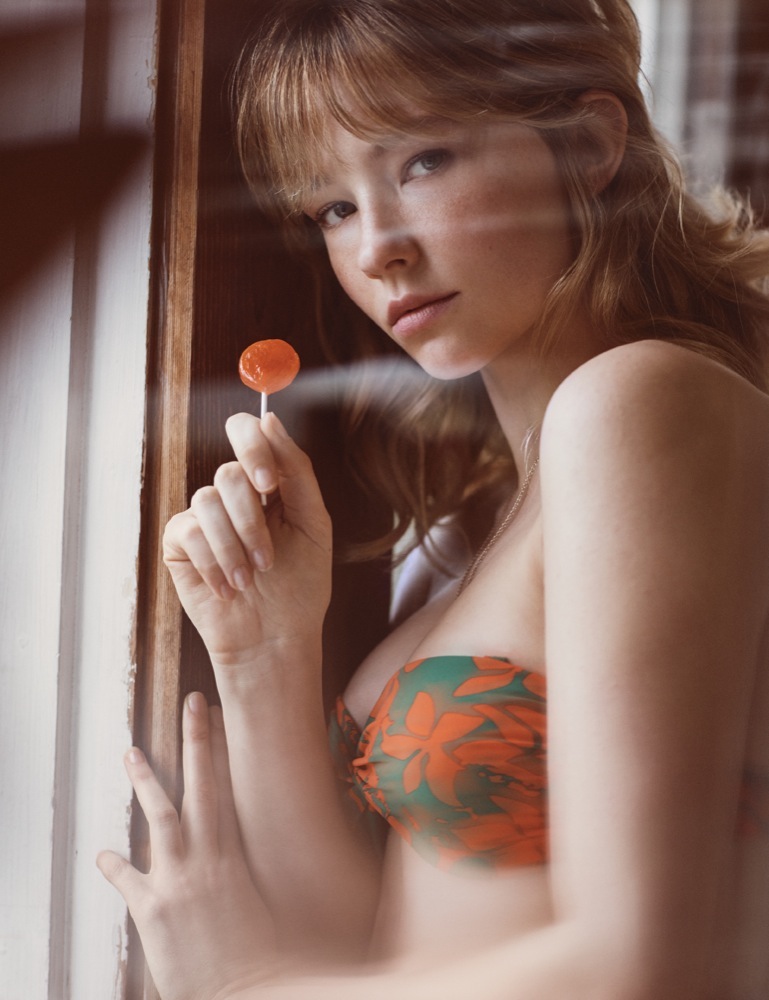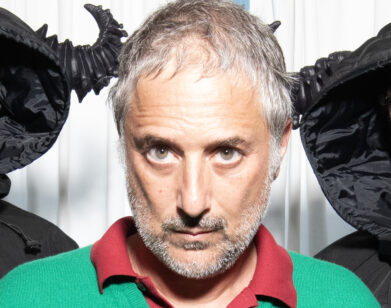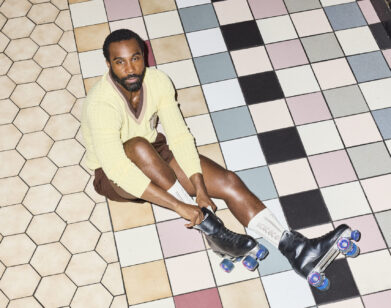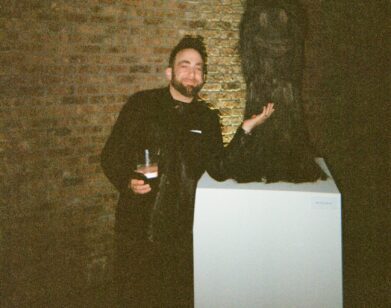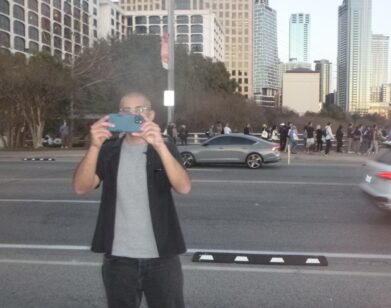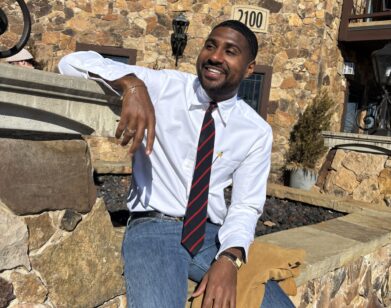Haley Bennett
Among the many fairy tales about our culture that we accept and perpetuate (mea culpa!) is that old doozy that ability, beauty, character, wiles, and stick-to-it-ness are rightly recognized for what they are and duly rewarded. Diamonds, when they are found to be in the rough, are rescued from their surroundings and placed on an inexorable ascent to the marquee. Well, yeah, except that the life of diamonds, and dreamers, is never that straightforward.
Allow me to reintroduce the very glittery dreamer Haley Bennett, who, in a very short while, will be all over your local marquees, right there at the top. It may not be the first time you’ve seen her, or even the first time you’ve recognized her, but over the course of the next few months, in an impressive range of high-profile films, Bennett will certainly be at the center of the story, central to the plot, at the center of our attention. Re-teaming with Antoine Fuqua, her pal from 2014’s The Equalizer, for the director’s reimagining of The Magnificent Seven, with Denzel Washington and Chris Pratt among others in ten-gallon hats and chaps, it is Bennett’s character Emma who sets the whole shoot-’em-up saga in motion, when she comes, lips atremble, to ask an outlaw to help bring about justice in the murder of her husband. But Emma is not just another dusty damsel in distress, Bennett says—nor is her mysterious Megan Hipwell, in the forthcoming thriller The Girl on the Train, a cookie-cutter heroine. As much as Bennett herself is a fan of the fairy tales we tell ourselves, her roles—whether in the upcoming PTSD drama Thank You for Your Service; in the eagerly anticipated Rules Don’t Apply, written and directed by Warren Beatty (in which he plays Howard Hughes); or the untitled and undated, definitely beautiful, probably brilliant tone poem by Terrence Malick—are dynamic and mercifully difficult to characterize. “Unconventional” is what Bennett calls the process of working with two of the great cinematic mythmakers, Beatty and Malick. And unconventional is how she happily describes her winding path to Oz.
Bennett was born toward the balmy bottom of Florida in 1988 and raised in the woods of Ohio. She moved a lot, dreamt a lot, read a lot. She wanted to be a performer. She moved to L.A. and became one, landing a role as a sort of clueless pop star in 2007’s Music and Lyrics with Drew Barrymore and Hugh Grant. But once past that threshold, into the wild and woolly world of Hollywood, her passage gets interesting. Roles continued to come her way (in Marley & Me, 2008, and in shorts by Shekhar Kapur and Cary Fukunaga), but where the fairy tale of fame would have thrust her into a superhero suit or something similar, Bennett’s fortunes found for her quite a different way. As she says, if she knew what that road held in store, she might not have taken it. But so says every dreamer who has gotten themselves lost in order to find their way—we’re all very happy that she did.
CHRIS WALLACE: Hiya. How are you?
HALEY BENNETT: Good, I’m still on New York time. I guess that’s why I got up so early, actually. I’ve been traveling—I live in New York—well, I guess I haven’t really spent my time in L.A. or New York in the past couple of years, but I go back to New York whenever I’m not working.
WALLACE: How do you handle being on the road?
BENNETT: Being nomadic isn’t sustainable forever. I’ve gotten to be really good at it. I have a couple Tupperwares that I send around the country when I’m working, filled with blankets and things that make me feel safe and at home no matter where I am.
WALLACE: A moveable feast. What are the things that make home for you? Things from childhood?
BENNETT: Yeah, I have quilts and—it’s really embarrassing—girly stuff. [laughs] Things from my bedroom when I was younger, memorabilia, letters, pillowcases, stuffed bunnies …
WALLACE: [laughs] Oh, come on, I had a stuffed seal until, like, last year.
BENNETT: Very cool.
WALLACE: In a way, I’m guessing that you’ve been preparing for this lifestyle for a long time, but when it suddenly happens … Are you sensing a gathering of intensity and expectations?
BENNETT: I mean, nothing’s really changed. I guess for a while it was like I was waiting for a pot to boil, and a watched pot never boils. When I stopped watching the pot, I guess the heat’s turned up a bit.
WALLACE: How did you stop watching, waiting? What did you occupy yourself with instead of waiting for the phone to ring, watching for the pot to boil? How does one do that? Please tell me.
BENNETT: Oh, my goodness. It’s been kind of a long journey for me. Everyone has a different path; I guess you hear them all. I don’t know how common mine is. I didn’t have a long-term plan or goal. If there would have been a road map showing me the way to my dreams becoming reality, I might have given it a second thought. All I came to Los Angeles with was a dream. No one from my family ever left Ohio. In L.A., I saw a lot of talent wasted because of fear. The odds are really stacked against you. But stumbling around blindly … I was following my intuition. I don’t know what was fueling me at the time. I was a bit like Dorothy following the yellow brick road I guess. Except there was no good witch.
WALLACE: Were you intensely ambitious when you first moved out West?
BENNETT: No, I knew that I needed more experience, because I didn’t want to wait around to make a fool of myself, if I ever had the opportunity. I’d only performed in minor parts in school, so I knew the bar would certainly be raised up above high school drama class. I was so terrified before an audience that I would break out in these ugly red hives, and my lips would quiver at the sight of a word or a song. So where was I going to overcome the stress of this terrible stage fright if I were to become a real performer? Or would I ever? I guess that’s where luck came in. It wasn’t this intense sense of ambition; I just wanted to be good. I enrolled at this random acting studio; there’s thousands to choose from. My research wasn’t very sophisticated; I think I opened the phone book and landed on this one. And after a few months of studying at the studio, I evidently made an improvement, because my acting coach insisted upon introducing me to some potential agents. I somehow managed to convince her to take a chance on me. And everything started moving quickly. I immediately began auditioning, and it was my third audition for this film Music and Lyrics that really changed the course of everything—followed by six more auditions; it was a lengthy process. But somehow I got the role. I moved to New York and, boy, those were the days, I have to say. Nothing came that easily ever again. It was a good start—I’m grateful for the experience, but I wanted more. After that film, I ventured back out into the darkness, as actors often do. And I was completely engulfed by it. I got lost, I got broke. I got heartbroken by the roles I’d never have a chance to play, because you know how it is. Even when a filmmaker pointed at me and said, “I want to put you in this film,” it never happened because of the financial aspect of our industry. I wasn’t a bankable name, I guess. But it went on like this, on repeat, for many years. I begged, I struggled, I fought. There was no other option, really.
WALLACE: How will this present slate of movies change things for you?
BENNETT: Look, I don’t see myself as successful because I’ve worked on only a handful of films. The way I look at it, if you’re really, really lucky, if you consistently work hard over the course of ten years, if you refuse to take no for an answer, if you surround yourself with great mentors and are a sponge, willing to learn, then you’re bound for something to happen. I don’t know what is going to happen. It’s either these films being great or me falling flat on my face. I guess I’m prepared for anything. I’ve always been prepared for anything.
WALLACE: Do you have mentors?
BENNETT: Oh, yeah. The people I’ve been fortunate to work with, people I look up to, other actors who gracefully do what they love to do and balance that with a rich personal life—that’s where my goals are. Warren Beatty has been an incredible advocate, a good friend. He reaches out to me and checks in. And Terrence Malick as well. Emily Blunt has been good to me.
WALLACE: Have any of them given you some particularly good advice?
BENNETT: Well, lately it’s been, “Pace yourself, pace yourself, pace yourself. And take time to rest.” I guess if you don’t rest and rejuvenate, then you harden, and I don’t want to harden.
WALLACE: You don’t seem at all jaded, cynical.
BENNETT: I feel hopeful.
WALLACE: There’s a moment in Magnificent Seven where you’re shooting a gun, and the Chris Pratt character comes in all hotshot-y and wants to teach you how to do it. But of course, you have this great fluency with firearms, and you say, “I had a father,” i.e., someone who taught me these essential skills. Did you have a dad who taught you special skills?
BENNETT: In terms of firearms, yes.
WALLACE: Really?!
BENNETT: On this film, everyone was so respectful; they treated me as an equal. I think they recognized my commitment. I wasn’t going to shy away. I was expected to do everything the men did, at the same level. I didn’t give myself any breaks. I didn’t make the excuse that I’m a woman. If anything, that’s what drove me to do better, to be stronger, to ride faster, stand taller. I worked myself until my fingers bled. And when I couldn’t walk from riding, I rode some more. I was unrelenting. My dad was very competitive, so I may have gotten that competitive streak from him. We rode our horses every day together. I had to break in my horse. I was mean to myself. The guys encouraged me every step of the way. We shot guns together; I could shoot with the best of them. My dad was a single father. And he was a hunter. I learned how to shoot when I was pretty little. My dad would take me deer hunting with him, which was pretty traumatic—Bambi [1942] was one of my favorite movies.
WALLACE: Did he take you through the whole dressing a deer?
BENNETT: Yeah. I grew up in the woods.
WALLACE: And did you eat venison after Bambi?
BENNETT: No. My dad would try to trick me and tell me it was steak. I banned steak. I banned all dark meat.
WALLACE: Are you still close to your dad?
BENNETT: Yeah. He lives in Ohio. None of my family left Ohio, but my mom lives in Naples, Florida.
WALLACE: Do you have fond memories from childhood?
BENNETT: That’s interesting. Your life is so different when you’re young. I go back to the same places that I grew up … We moved around in Ohio quite a bit. But it was music and books and literature. I think that’s what drew me to stories; that, no matter where I was, I could always go back to this one thing, this one story. My siblings were pretty far apart in age, so I sort of grew up as an only child.
WALLACE: What were the stories that you were particularly fond of?
BENNETT: The Lion, the Witch and the Wardrobe, those magical stories of greater than life, epic … I really identified with The Wizard of Oz.
WALLACE: Do you still fantasize?
BENNETT: Yeah, I spend a lot of time with stories and musicals. I live in New York, so one of my favorite pastimes is to go to the theater.
WALLACE: How is your life different as an adult? Is it because there are responsibilities and anxieties?
BENNETT: No, I surprisingly don’t exist conscious of those things. That’s perhaps why I’ve survived in this denial of reality, in a way.
WALLACE: You live in Oz. In Narnia.
BENNETT: Yeah. Well, luckily because of art, I’m able to do that.
WALLACE: So what kinds of things do you dream about now?
BENNETT: Well, my next dream is to build a farm on an island, actually. In Martha’s Vineyard, West Tisbury—which is what [C.S. Lewis] based Narnia on.
WALLACE: And would you raise animals?
BENNETT: Oh, yeah, animals, alpacas, goats. I have two cats and two dogs, and I’d like to get another cat. I love animals. Rescue some more animals and spend a lot of time there.
WALLACE: I know you cook. I was actually hoping we’d get to cook together …
BENNETT: Oh, my gosh, when I was auditioning with Antoine, for The Magnificent Seven, my final screen test, I brought in an apple pie. I always joke that that’s what really got me the role.
WALLACE: You bake! What is it that you enjoy about cooking, apart from the eating?
BENNETT: It’s meditative. And it’s simple. I really enjoy simple things in life. I just like the idea of bringing together a few ingredients and being able to transform it into something delicious and warm that my friends can sit around and enjoy. Most of my socializing is based around good food and good wine.
WALLACE: Who is the dream dinner-party guest? Who would you invite over to your Narnia on Martha’s Vineyard?
BENNETT: Honestly, my parents. I don’t get to see them enough. They’re separated, but right now my dream is to get all of my family together around a large table, because I’ve really neglected them over the past two years. I’ve really exhausted myself. And that’s why I’m taking a break for the next six months. Thank You for Your Service kind of blindsided me, because after The Magnificent Seven and The Girl on the Train, I knew that I needed to take some time and find myself again. But I couldn’t not pay attention to that story. There was a passionate writer-director, Jason Hall; there was Jon Kilik, the producer; there was Miles Teller in place to play our hero, Adam Schumann. So that last film really, I think, was the straw that broke the Haley-camel’s back.
WALLACE: How are you going to relax during that six-month hiatus?
BENNETT: I’m going to Santa Fe. I fell in love with Santa Fe while we were filming The Magnificent Seven. I just want to do nothing, which sounds really boring, but boring is good for me right now.
WALLACE: Nothing is my hobby.
BENNETT: It’s my favorite thing to do: luxurious nothing. Actually, if you know anybody, I’m trying to learn how to play the guitar. I learned how to play years ago, and it’s a skill that I lost. Singing was something that I’ve always loved to do. And I would love to be able to write music. I’d love to be able to sit around a campfire and play the guitar and make up stupid songs.
WALLACE: New Mexico would be a nice place for that.
BENNETT: I could imagine myself there.
WALLACE: You posted a picture on Instagram not long ago of Marilyn Monroe behind the scenes on The Misfits [1961]. The story of the making of that movie is almost as notorious as the movie itself. Were you guys having a good old time during the filming of Magnificent Seven?
BENNETT: Yeah, part of the fun of Magnificent Seven is the mix of the seven guys, and they all have incredible chemistry. The glue that kept us together was the joking and bonding that happened behind the scenes. There were late nights where we were all just delirious, and it was a lot of fun. I love to make people laugh. I have a lot of fond memories. We had the Fourth of July; we set off fireworks. I made a peach cobbler.
WALLACE: Do you stay in touch with the guys, like, “Hey, remember that funny time when …?”
BENNETT: Thanks to modern technology, yes. But I feel nostalgic about the way it was done in the past. Like, maybe instead of being on a group text, we’d write letters to each other. And since I like to travel with my letters, that would be nice—I’m not going to print out my text messages. I wish I could have been part of an era that doesn’t exist anymore. Those relationships, they’re meaningful now, but it’s difficult. I always leave with a heavy heart.
WALLACE: I’m curious about working with Malick, who is notorious for the … uniqueness of his process.
BENNETT: Working with Terrence, you could wake up in the morning in Los Angeles or New York or Kenya, and you’d get a call saying, “Haley, I need you to come shoot with the migration of purple martins.” And you click your heels and you’re in Austin, Texas, shooting with a flock of purple martins. You get your dialogue FedEx-ed to you. And you’re on your merry way. It’s completely unpredictable and so exciting.
WALLACE: And you go from that to something like the Warren Beatty movie, which I imagine is very much like old-school Hollywood filmmaking.
BENNETT: Oh, my gosh. This film is very reminiscent of some of my favorite films from the ’40s, ’50s—Preston Sturges … You really get immersed in this Hollywood culture. Warren is Howard Hughes. And it’s an emotional story; it takes you to these strange nooks and crannies of our business back in the day. And it leaves you with a really good feeling. He’s so good. Actually, the first time I met Warren, we had about a six-hour meeting, and I had no idea what I was meeting him about. Even when I was shooting the film, I had no idea what it was about. He just said he really wanted me to be this tough, boisterous woman. He said, “I know you’ve got it in you. I want you to sing and really belt it out, and do a show tunes number.” So I guess it was a little bit reminiscent of the way I worked with Terrence Malick. Unconventional. I think that’s the theme of my career, unconventional.
WALLACE: So, when you’re taking stock, taking some time to recuperate, what are you going to be looking back on and going, “That, so far, is the coolest thing I’ve done”?
BENNETT: It’s really hard to determine. And I feel so lucky to be able to say that. When I was doing my research for Magnificent Seven, I’d say that in 95 percent of the Westerns I’d identified, the women were either invisible, off in the background, the damsels in distress being objectified, or all of the above. And the guys in this film were so expressive about their excitement to be a part of a Western, because it was like they were fulfilling a childhood dream. And I was disappointed because I couldn’t share in the delight, you know? But I did get excited about the possibility of what this could be and what this could mean for young women out there. I got to be included in every conversation about the script with the Seven. Everyone had a voice, and I was terrified that I might not find mine. I think because of this sort of stereotype, I wondered if I was in over my head at times. And this is very reflective of what Emma was going through. So I had to take on the mindset of my character, Emma. She’s assertive, she asks for what she wants. She’s a boss lady. She wasn’t going to be shuffled along or hide or give up. I think that I found that extra bit of strength through her. I remember we were shooting in a church that was burned down by Peter Sarsgaard’s character, Bogue, that same week of that horrendous shooting in Charleston. That really shook us, and it was a reminder. The theme of this film is that there’s always going to be evil, but the way we unite, regardless of class, race, religion, or gender, empowers the goodness in the world. That’s a powerful example to make. And that’s what the Seven find themselves doing. These men, who are kind of lost, get to discover that there’s a hero inside of them. Even if their chances of winning are a million to seven. It is the story of redemption.

